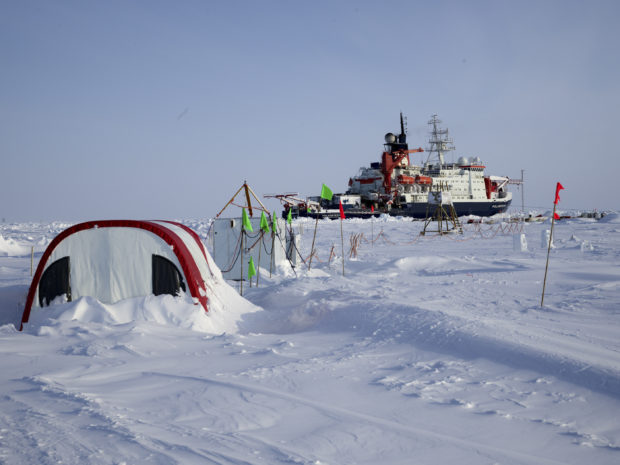Pandemic forces Arctic expedition to take 3-week break

German Arctic research vessel Polarstern in the ice next to a research camp Ocean City in the Arctic region. Image: Alfred-Wegner-Institut/Michael Gutsche via AP
Organizers of a year-long international Arctic science expedition say they have found a way to keep going despite difficulties caused by the pandemic lockdown, but it will require a three-week break in the mission.
Germany’s Alfred Wegener Institute for Polar and Ocean Research said Friday that the expedition ship RV Polarstern will leave its position in the high Arctic next month and break through the surrounding sea ice to rendezvous with two German vessels bringing supplies and crew replacements.
The maneuver is necessary because travel restrictions imposed to prevent the spread of the new coronavirus make a planned resupply by air or sea from Norway or Russia impossible.
Expedition leader Markus Rex told The Associated Press that the lockdown could have scuttled the remainder of the mission.
“For a long time it was on a knife-edge and there was even a possibility that the expedition might have to be broken off,” he said.
The 140-million-euro ($158 million) expedition set out last September with 100 scientists and crew from 17 nations including the United States, France, China and Britain. Its goal is to study the impact of global warming on the Arctic and improve scientific models used to forecast how the climate will change worldwide.
As temperatures in the Arctic plummeted and the ocean surface froze over last fall, scientists built a research camp on the ice with the Polarstern acting as their base.
Rex said expedition members will have to pause numerous scientific measurements during the three-week supply run, but that this was preferable to abandoning the mission entirely.
“In view of the massive challenge caused by the global pandemic, we’re very glad that we can do this,” he said. If all goes well, the Polarstern will return to its research post and continue the expedition until October as planned.
Two Twin Otter aircrafts that came in via Canada were able to land on the ice next to Polarstern Wednesday and pick up seven team members who urgently needed to return home, but the planes were too small to allow for the larger crew rotation and resupply required.
Rex said that new crew members who will arrive by ship to replace those currently onboard Polarstern will have to spend 14 days in quarantine in the German port city of Bremerhaven first, to ensure they are coronavirus-free.
Being cut off from the rest of the world on a sea of ice has afforded those currently on the expedition small perks not possible elsewhere right now, said Rex.
“It’s one of the last human communities in the world where a hundred people can have a barbecue together,” he said. RGA
RELATED STORIES:
Climate change turns Arctic into strategic, economic hotspot
For more news about the novel coronavirus click here.
What you need to know about Coronavirus.
For more information on COVID-19, call the DOH Hotline: (02) 86517800 local 1149/1150.
The Inquirer Foundation supports our healthcare frontliners and is still accepting cash donations to be deposited at Banco de Oro (BDO) current account #007960018860 or donate through PayMaya using this link.